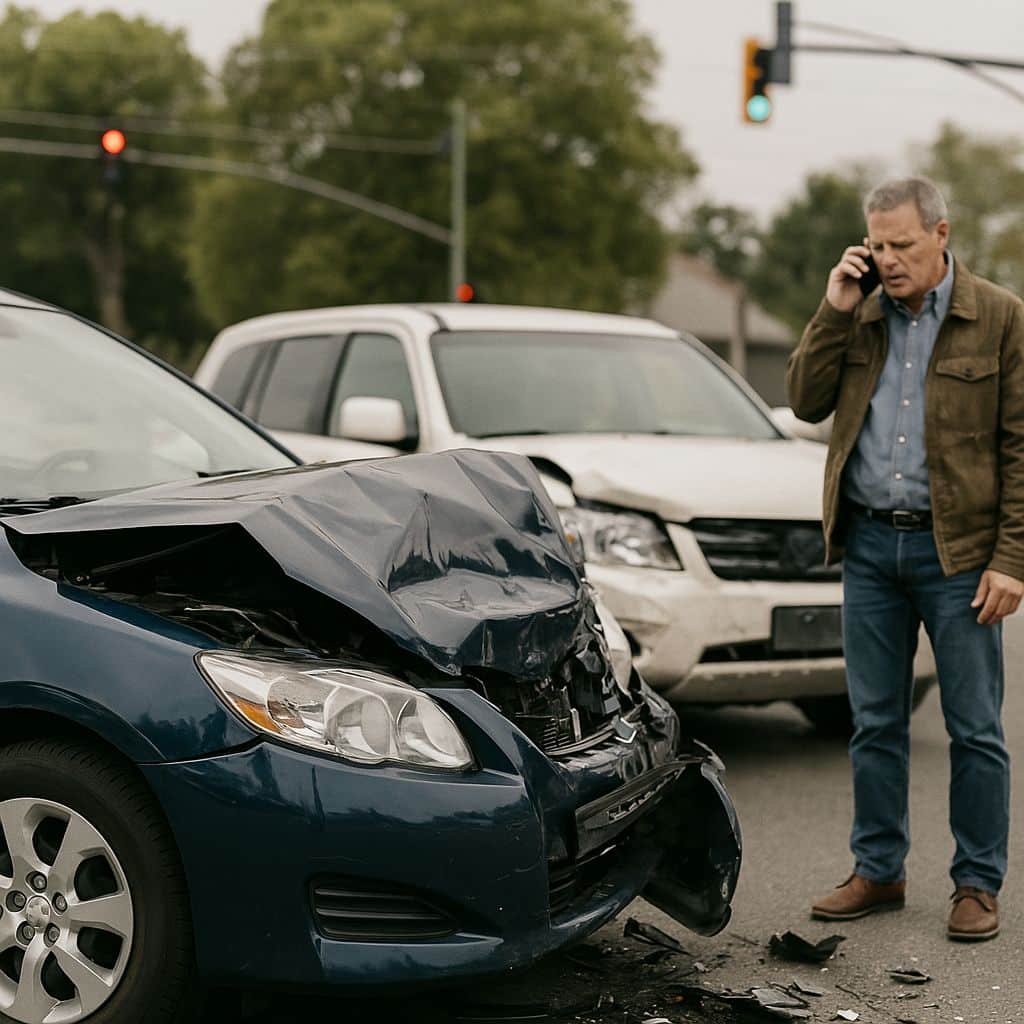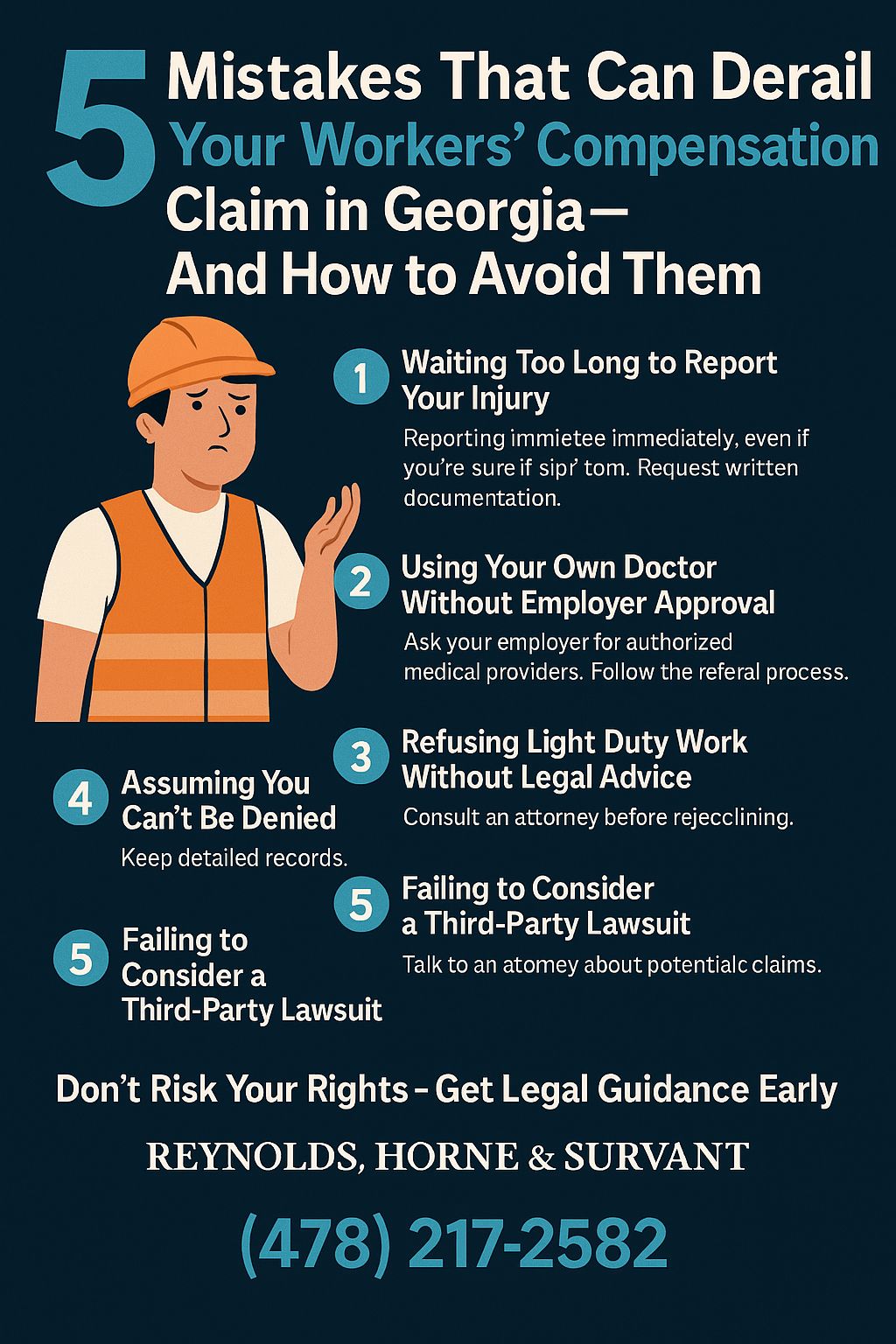Most people assume that once you report a car accident, the insurance company will step in, review the damage, and do what’s right. In Georgia, that’s rarely how it plays out. These companies operate with financial interests in mind. Their focus is often on resolving claims at the lowest possible cost. And if your accident happened in Macon or anywhere in Middle Georgia, you may be up against regional adjusters trained to stall, minimize, or redirect. The good news is that their playbook is predictable. The better news is that it can be countered if you know how they operate.
How Insurance Adjusters Downplay Injuries After a Georgia Car Crash
The first time you speak to an insurance adjuster, it may feel like they’re on your side. They ask how you’re feeling. They say they want to help. But that’s the start of a well-tested routine designed to protect their payout, not your health. In Georgia, adjusters are trained to shift the narrative early, usually by suggesting that your injuries aren’t as serious as they seem. If you didn’t go to the emergency room that day, they’ll question whether you were hurt at all. If you waited two days to see a doctor, they’ll imply your pain started later, not from the crash. It’s subtle. But every word they record can be used to shrink your claim.
What they’re really doing is laying the groundwork for later arguments that your treatment was excessive, unrelated, or unnecessary. They may send you forms that ask about “prior conditions” or “pre-existing issues.” These are not meant to understand your health but to link your pain to something other than the crash. Georgia law doesn’t require you to be injury-free before an accident to claim damages. But insurance companies know that juries can be swayed by doubt. That’s why they plant it early.
If your medical provider uses certain language like “soft tissue injury” or “subjective pain report,” adjusters will often seize on it to argue that the damage isn’t measurable or visible, and therefore not compensable. They may also compare your treatment timeline against their internal “norms,” which aren’t based on your body but on claim reduction strategies. What they won’t tell you is that Georgia law allows recovery for pain and suffering even when objective imaging is limited. They’re not here to explain that. Their position often reflects an effort to minimize the cost of your recovery.
This is why saying too much too soon can backfire. A simple “I’m feeling okay” on a recorded line might later be used to discredit weeks of physical therapy. Georgia attorneys who handle these cases know that adjusters record everything with one goal. That goal is to use your words to lower their exposure. They’ll smile while doing it. But make no mistake, what they’re building is a defense, not a solution.
Why You Should Never Accept the First Settlement Offer After an Accident
The first offer can catch you off guard. You’re dealing with medical bills, missing work, and a dozen unanswered questions. It’s easy to think, maybe this is enough. But that’s exactly what the insurer wants you to think, before you know what your case is really worth. A check, even a small one, feels like progress. That’s exactly what the insurance company is counting on. In Georgia, first offers aren’t based on the full value of your claim. They’re based on the hope that you’ll take the money before you know what your case is worth. And once you accept, there’s no going back.
Insurers know that early offers look generous when you’re facing bills, missed work, and unanswered questions. They also know most injury victims haven’t had time to get a complete diagnosis, let alone calculate future treatment or lost wages. So they move fast, sometimes within days, to close the file. These offers often exclude pain and suffering, ignore long-term care, and assume your recovery will be simple. In Georgia, that assumption can cost you tens of thousands.
What makes this dangerous is how permanent it is. Accepting a settlement usually comes with a release form that waives your right to pursue further legal action, even if new injuries emerge or the original ones worsen. Many people in Macon sign these documents without fully understanding them, especially when adjusters frame the offer as “fair” or “standard.” But once signed, even the most experienced attorney can’t reopen the case.
The right time to consider settlement is after a full medical evaluation, a clear understanding of liability, and a calculation of all current and future damages. In Georgia, personal injury law allows for recovery of both economic and non-economic losses, but only if you haven’t signed them away. A real offer should reflect what you’ve lost, what you’ll continue to lose, and what it takes to rebuild. Anything less is strategy, not fairness. And in this game, strategy always favors the side that knows the rules.
Common Delay Tactics Used by Insurance Companies in Macon Injury Claims
Delays are one of the most common tools insurers use after a car accident. They often don’t look like delays at all. In Macon and across Georgia, claims are frequently stalled under the appearance of routine procedure: extra paperwork, missing documents, claims “under review,” or agents who suddenly become unavailable. Behind the scenes, these tactics are designed to wear you down. The longer you wait, the more likely you are to settle for less, walk away, or run out of legal options before Georgia’s statute of limitations closes the door completely.
One common move is the silent stall. You submit everything they ask for, medical records, repair estimates, proof of income, and then hear nothing for weeks. When you call, they say your file is being evaluated by another department. Or that they’re waiting on clarification. Or that your adjuster is out of office. These are not accidents. They’re designed to shift pressure onto you. These tactics often create a sense of uncertainty and delay for people navigating the claims process alone.
Another tactic is the documentation loop. They keep asking for new forms, slightly different versions of things you’ve already sent. Medical records “need to be more specific.” Bills “must be itemized differently.” You’re not being asked for better proof. You’re being asked to spin in circles. And for some claimants, especially those without legal representation, that confusion works. It breaks momentum and creates the false impression that the delay is your fault.
In Georgia, many of these practices may not meet the legal threshold for bad faith as long as they appear procedurally reasonable. Insurers know the time limits: two years for most personal injury cases. But they also know that most people don’t. So they drag the case close to that line, hoping you’ll get desperate, tired, or miss it entirely. That’s why experienced attorneys act early. Not just to push for payment, but to stop the stalling before it turns into strategy. Because every “we’re still reviewing” is a quiet bet that you’ll run out of time before they run out of excuses.
What to Do If the Insurance Company Denies Liability for a Clear-Cut Crash
Nothing feels more frustrating than hearing “we’re not liable” when you know the other driver caused the wreck. In Georgia, fault isn’t always decided by who had the red light or who was rear-ended, at least not in the eyes of the insurer. Instead, they may deny liability outright, banking on the hope that you won’t fight back. This happens even in cases where police reports, eyewitnesses, or photographs clearly point to one party. The denial isn’t about facts. It’s about pressure.
The first thing to understand is that an insurance company’s denial doesn’t carry legal authority. It’s not a ruling. It’s a position. And in many cases, it’s a strategy designed to push you toward a lower settlement or no settlement at all. They may argue contributory fault, question your injuries, or say there’s “insufficient evidence.” Even when the evidence is sitting in their own file. In Georgia, the law allows insurers to assert denial as long as there’s any wiggle room. Which means it’s up to you, and your lawyer, to close that gap.
When a claim is denied, timing becomes critical. The insurance company now assumes you’re in a weaker position, and delays will increase. You need to act quickly to preserve evidence, contact any witnesses, and push for a written explanation of the denial. Most importantly, you need legal representation. Without it, they assume the denial will stick. With it, they know the process shifts. It moves from negotiation to litigation risk.
In Macon and across Georgia, experienced attorneys respond to denial by reframing the case around facts insurers don’t want to argue in court. They submit demand letters with supporting documents, cite Georgia case law, and prepare the file for trial from day one. Because when a company says “we’re not responsible,” what they’re really doing is testing whether you know how to make them prove it. And if you don’t answer, that test becomes the final word.
When a Bad Faith Insurance Claim Becomes Grounds for Legal Action in Georgia
Most policyholders assume that if they’ve paid their premiums and followed the rules, their insurance company will treat them fairly when it counts. But in Georgia, that assumption is tested often. Especially after a serious car accident. When an insurer doesn’t just undervalue your claim but intentionally obstructs, delays, or manipulates the process, it may cross the line from tough negotiation into bad faith. And under Georgia law, that line is legally actionable.
Bad faith doesn’t always show up as outright denial. Sometimes it’s a pattern of unreasonable delays. Sometimes it’s a refusal to communicate. Sometimes it’s a lowball offer with no explanation, even when the evidence clearly shows higher damages. When these actions violate the duty of good faith and fair dealing, a duty Georgia law imposes on all insurers, it opens the door to a separate claim against the company itself. That means not just recovering what you were owed, but potentially also penalties, interest, and attorney’s fees under Georgia law.
Under Georgia law, if an insurer refuses to pay a valid claim and ignores a proper demand for more than 60 days, they can face more than just the original amount owed. The court may add penalties, cover your attorney’s fees, and even apply interest. But to get there, you need to prove that their refusal wasn’t just slow; it was unreasonable. In some cases, this added liability forces insurers to reconsider their tactics quickly. But it only works if the demand is made properly, and if the bad faith is clearly documented.
What makes bad faith especially harmful is how quiet it is. The letters sound professional. The delays look procedural. The tone stays polite. But behind it, there’s a strategy. These patterns can pressure injured people into accepting less than they may be legally entitled to recover. In Georgia, that strategy is unlawful once it crosses into indifference or dishonesty. That’s why attorneys experienced in car accident litigation don’t just fight for the claim. They watch the insurer’s behavior too. Because when the company stops playing by the rules, the case isn’t just about the accident anymore. It’s about accountability.
Georgia Insurance Claim FAQ: What to Know After a Car Accident
1. Should I speak to the insurance company before I talk to a lawyer?
You’re allowed to, but that doesn’t mean you should. Insurance adjusters are trained to limit their company’s losses. They aren’t required to explain your rights, and they won’t tell you what might hurt your case. If you’re unsure, speak with an attorney before you say anything recorded or binding.
2. How long does the insurance company have to respond to my claim in Georgia?
Once you’ve sent a proper demand letter, they have 60 days to make a decision. Without that letter, there’s no legal deadline. Some claims sit for months without movement unless you push back. That’s why a well-timed legal notice changes everything.
3. The adjuster offered me money right away. Should I be concerned?
Yes. A quick offer is often made to close your case before your injuries are fully understood. Once you accept, your case ends, even if more serious problems appear later. Speak with your doctor. Then speak with someone who understands the law. There’s no rush when it’s your future on the table.
4. What happens if I ignore the adjuster’s call for a few days?
Nothing harmful, legally speaking. You’re not required to respond immediately. But everything you say, even later, can be used to shape your case. If you’re unsure how to handle the call, a lawyer can speak for you. Once you hire counsel, you don’t have to speak to the adjuster again.
5. Can an insurance company be sued for bad faith in Georgia?
Yes, if they mishandle your claim without a valid reason. Georgia law allows you to take legal action if the company ignores evidence, delays too long, or acts dishonestly after a proper demand is made. If proven, you may recover additional damages beyond your original claim.
6. What kind of proof shows that an insurer acted in bad faith?
Anything that reflects a pattern of unfair behavior. Delayed responses, shifting explanations, or refusal to engage with evidence can all count. The stronger your paper trail, the stronger your case. Courts look at actions over time, not isolated mistakes.
Ready to Push Back Against the Insurance Company? We’re Ready Too.
If you’ve been in a car wreck and the insurance company isn’t moving, you don’t have to face it alone. Reynolds, Horne & Survant has been helping clients across Middle Georgia for over 50 years. We don’t rush cases. We prepare them properly. And if your claim deserves to be in court, we’ll take it there.
📞 Call (478) 217-2582 to schedule your consultation. You’ll sit down with someone who takes your case seriously and knows what it takes to get results.





